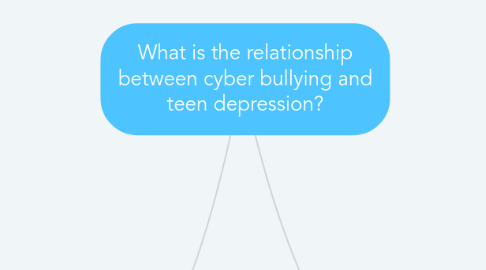
1. Cyber bullying leads to teen depression.
1.1. Because this shows what is cyber bullying, how it's used, and also how it can make a person to become depressed.
1.2. Because cyber bullying is a person sending negative and harmful messages and images to another person which causes the person to become depressed (Phillips).
1.2.1. Phillips states in the article that "cyber bullying is the use of the internet or other digital devices such as E-mail, instant messaging, text messages, and social networking sites to send hurtful and inappropriate message and images of another person" (Phillips).
1.2.1.1. This quote makes me think... Cyber bullying makes me think that people who are sending the mean hurtful and inappropriate messages should be ban from any type of technology because what they are doing is totally not right.
1.2.2. Phillips noted that "according to a study, Four in ten teens have experienced bullying online and girls are twice as likely to be victims and perpetrators but boys are more likely to target girls and less aggressive males" (Phillips).
1.2.2.1. This quote means... Teens who have experienced bullying online, girls are more likely to be victims and perpetrators but boys are more likely to cyber bully girls and males who are not that tough.
1.3. Cyber bullying can make the person who is getting cyber bullied not like themselves and can also make the person feel useless (MacDonald).
1.3.1. MacDonald states that "according to a doctor traditional bullying may be confined to the schoolyard, but cyber bullying can follow its victims where ever they go, at any time of the day" (MacDonald).
1.3.1.1. This shows that regular bullying can be solved with someone else around to help but cyber bullying can stick with someone 24/7 no matter where they go because the things that were said about them online never go away.
1.3.2. MacDonald states that "In Canada, one in four kids surveyed recently admitted they have been "mean or cruel" to someone online and Media Smarts polled 5,436 Canadian students in grades 4 through 11 about online issues and they found that of the one in four who have been cruel to others online, more than one in three say they are a victim" (MacDonald).
1.3.2.1. This matters because this shows how many kids have been mean or cruel to someone online and also how many say that they are a victim out of a large amount of students in grades 4 through 11.
1.4. Because all of these things about how cyber bullying affects a person by not liking themselves and making a person feel useless is true.
2. Cyber bullying does not lead to teen depression.
2.1. Because this is saying that even though we here stories all the time from people about cyber bullying no one has the evidence or data to support a major thing like cyber bullying.
2.2. Everyone is talking about cyber bullying as if its a big deal, but they don't have the data to support such a big deal like cyber bullying (Cushing).
2.2.1. Cushing notes that "58% of kids admit someone has said mean or hurtful things to them online but the most surprising thing about this stat is that it isn't close to 100%" (Cushing).
2.2.1.1. This makes me think that even though there have been 58% of kids who've had mean or hurtful things said about them online that is not really close to a 100% so it's really not a form of cyber bullying.
2.2.2. Cushing mentions that anti-bullying group "I-safe says 42% of kids have been bullied online, but only 25% have had it happen more than once"(Cushing).
2.2.2.1. This means that almost 50% of kids say they have been bullied online, but only a quarter of kids have had it happen to them more than once.
2.3. The focus on cyber bullying should not distract leaders and parents from solving the problem of traditional bullying (Jayson).
2.3.1. Jayson argues that "reports of a cyber bullying explosion over the past few years is because of the increasing use of mobile devices" (Jayson).
2.3.1.1. This shows that people have been using there mobile devices a lot and that has been causing a lot of reports over the past few years of cyber bullying.
2.3.2. Jayson claims that "there is very little scientific support to show that cyber bullying has increased over the past five to six years, and this form of bullying is actually a less frequent phenomenon" (Jayson).
2.3.2.1. This matters because there is very little evidence that shows cyber bullying has increased and over the past few years and this type of bullying has not been a big of a issue.

